Is It Safe to Feed Dogs Walnuts
Dogs can go nuts for nuts. But should they eat them?
Some nuts can be harmless for dogs, while others can wreak havoc on their digestive system.
Before you pick a nutty butter to stuff your dog's Kong toy or serve doggie trail mix to your four-legged companion, learn what crunchy goodness is safe for them to eat and which nuts are better to avoid.
- Nuts That Dogs Can Eat
- Nuts to Avoid
- So, Are Nuts Safe for Dogs?
Nuts That Dogs Can Eat
Since most of us humans love nuts, and dogs always beg for them, it's worth figuring out if it's safe to share these treats with your fluffy friend.
Although nuts have a lot of health benefits when included in a human diet, the long-term effect of eating nuts on canine health is still an unexplored area. The prevailing theory is that nuts are too calorie-dense and fatty for canines and that they shouldn't be a regular part of their diet.
However, most animal experts agree that occasionally giving a few nuts to your dog will not harm them. The only thing you need to know is which nuts your dog can eat.
Peanuts
Although peanuts are safe for dogs to eat, they can't be salted, coated, candied, or caramelized. Dogs can't eat peanuts in shells, but a few bare peanuts, whether roasted or raw, make a healthy reward.
Peanuts are a good source of protein, which is an essential nutrient for dogs. But that's not all. Peanuts also contain arginine, an amino acid that is important in the production of nitric oxide, which helps with blood circulation. Because of this, peanuts can help to reduce your dog's risk for heart disease and high blood pressure.
While there are many benefits of feeding your dog peanuts, it is important to remember that they are high in fat, so make sure to keep peanut treats to a minimum. Peanuts can also cause an allergic reaction in some dogs.
Can Dogs Eat Peanut Butter?
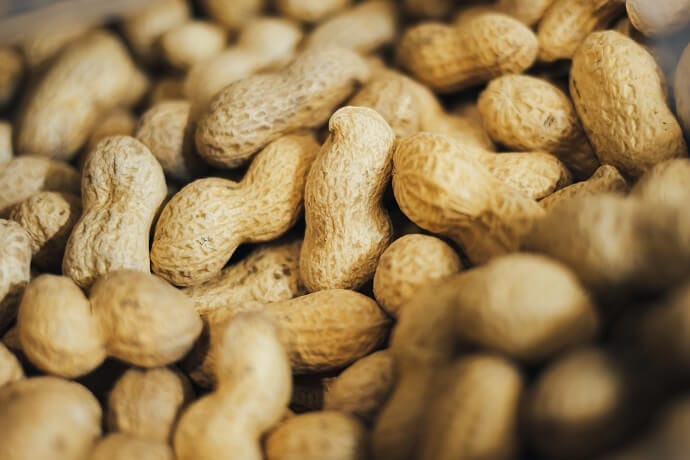
Well, peanut butter is not a nut (neither are peanuts, actually) but it's everybody's favorite nut-based yumminess, which deserves to be mentioned. Peanut butter is okay for dogs, but only if it's not loaded with artificial preservatives, sodium, and sugar.
Before you treat your pooch to a spoonful of creamy (or chunky!) deliciousness, check the label for any ingredients that might be harmful to canines (for example, Xylitol). And when I say spoonful, I mean it — just a little occasional lick and not a peanut butter feast!
If you use peanut butter to help your dog take a pill, make sure that the calories of all combined treats don't exceed 10 percent of dogs' total daily calorie intake.
Chestnuts
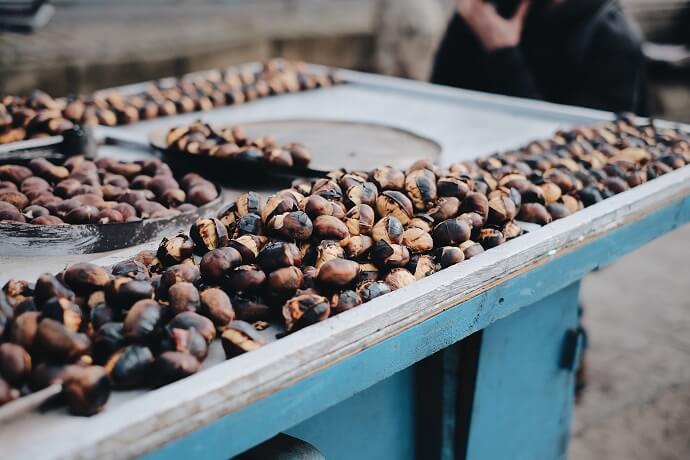
A welcome guest at Thanksgiving feasts, roasted chestnuts will not harm your pooch. The fiber content of chestnuts can help your dog avoid constipation. Chestnuts are a good source of vitamins C, B1 and B2, potassium, iron, and copper.
But, like all other nuts, these round, delicious bites are full of fat and carbs and can be hard on your pooch's tummy if they overindulge. Even in the form of a puree, chestnuts should be given to dogs only in small quantities. Also, if you're buying them from the store, make sure that they are plain and not salted or seasoned.
Nuts to Avoid
In general, all nuts can be dangerous for dogs if they consume too much of them. Some of the nuts in the list below can be eaten by dogs, but tend to cause more trouble than they're worth. Others can be poisonous to dogs or cause various health problems, even if given as treats.
Same as with other human foods you're thinking of giving to your dog, it's best to err on the side of caution, and stay away from these nuts altogether.
Almonds

Dogs can eat almond nuts as they are not toxic to them, but canines tend to digest almonds poorly. Even unsalted almonds can upset your dog's stomach or if the pooch in question is more sensitive, gastric intestinal distress. Of course, it's important to note that you should never give salted, seasoned, sugar-coated, or chocolate-covered almonds to your dog.
Also, they're a choking hazard. Almonds are small in size but have a hard shell that makes them difficult for dogs to chew and swallow. This can cause an obstruction in their throats or digestive system, which could be fatal if not treated immediately.
Hazelnuts
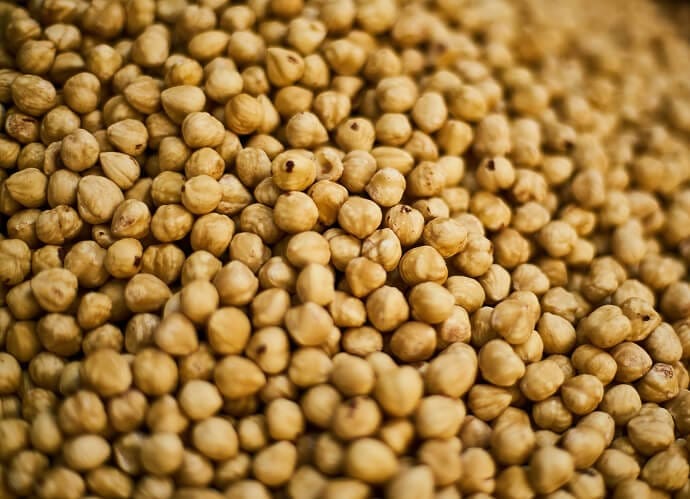
First of all, let me make something clear: dogs can eat hazelnuts, in theory. They are not toxic to canines, and your pooch won't have any problems if they eat a couple of unsalted, uncoated hazelnuts.
Same as almonds, hazelnuts are just about the right size to be a choking hazard or to cause intestinal obstruction. Small dogs can choke on hazelnuts, and larger dogs tend to gobble them up without chewing, which leads to hazelnuts getting stuck in their intestines and causing significant problems.
Cashews
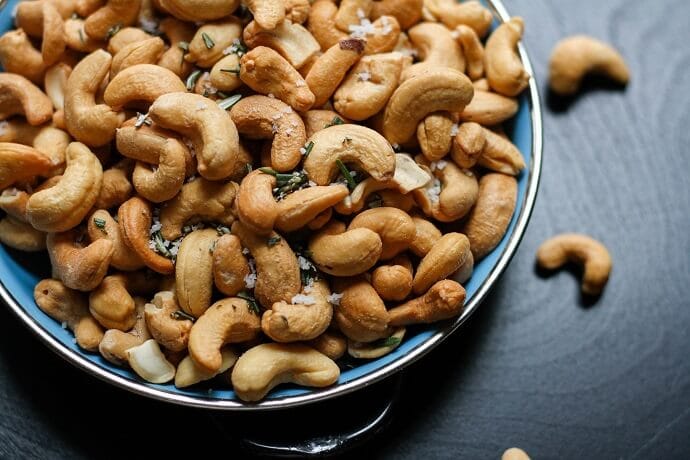
For healthy dogs, one unsalted cashew or two won't be harmful. The cashews must be roasted or baked because when raw, they can contain a dangerous toxin, similar to the one found in poison ivy. But, even though they are technically safe for dogs to eat (in the right form), cashews have a high level of potassium and can cause health issues with dogs that are prone to urinary problems.
Although cashews are a good source of protein, they contain high amounts of fat and calories. Also, cashews are large nuts, posing a choking hazard, even for large breeds. But this is especially true for small breeds. There's also the danger of intestinal blockage.
Walnuts
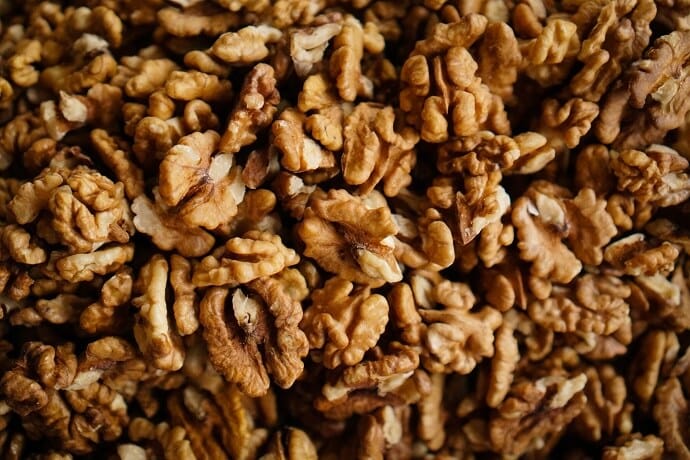
Walnuts should not be fed to pets. Apart from the risk of intestinal obstruction and stomach irritation, walnuts can be toxic to dogs due to a high chance of mold contamination. Moldy walnuts (any variety) can contain fungi producing tremorgenic mycotoxins, and if your dog is exposed to it, they can have seizures and other dangerous neurological complications.
Black walnuts are particularly dangerous for dogs. The toxic principle is unknown but may be related to a compound called juglone found in all parts of the tree. The toxin can cause weakness, paralysis, and even death. If your dog eats black walnuts, you should contact your veterinarian immediately.
In case you need to provide basic medical care prior to taking a long ride to a vet, consider using an online Vet Chat to get personalized 24/7 help from certified professionals.
Pistachios
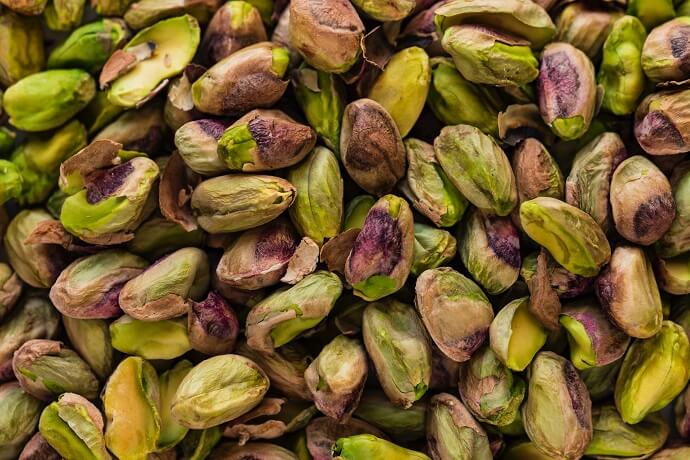
These green nuts are a human favorite, but when it comes to canines, pistachios can be harmful. They can carry Aspergillus mold that produces aflatoxin and can wreak havoc on your dog's liver. Apart from risky fungi lurking about, pistachios are also a choking hazard and can block your pooch's intestine — particularly when not shelled.
The high amount of fat in pistachios could also cause pancreatitis. If your dog does eat pistachios, it's important to watch for signs of gastrointestinal distress. Even more, pistachios are high in calories, which can cause weight gain in dogs.
Pecans
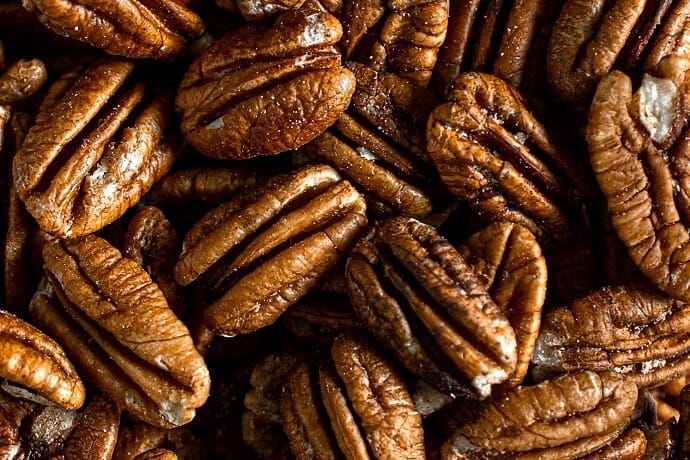
A slice of pecan pie might be just what you need on a rainy day, but your pooch should stay away from these tasty nuts! Same as pistachios, moldy pecans can have aflatoxin produced by the Aspergillus fungi, a substance that can cause liver damage to dogs. Pecans are also high in omega-6 fatty acids, which can lead to inflammation in dogs.
Macadamia Nuts
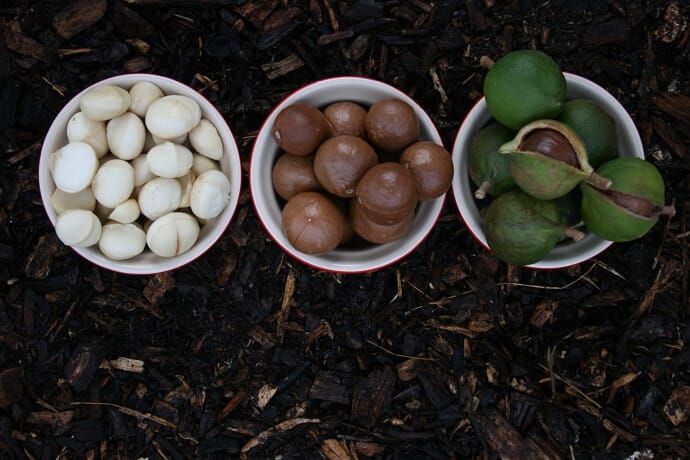
According to the research of the ASPCA National Animal Poison Center, macadamia nuts are poisonous to dogs. Just like with raisins, scientists have yet to discover what substance present in these nuts causes toxicity in canines, but the effects can be severe. Dogs who have eaten macadamia nuts have been known to experience weakness in their legs, vomit, shiver, have diarrhea, and fever. Your dog might get all of the symptoms of macadamia poisoning, or just a few of them.
In the study, the amount of macadamia nuts consumed by dogs was estimated in most calls with an average of 11.7 g/kg bw. So, even one macadamia nut can seriously harm your dog. Contact a vet immediately if you suspect your pooch got their paws on these nuts or you notice any of the aforementioned symptoms.
Pine Nuts
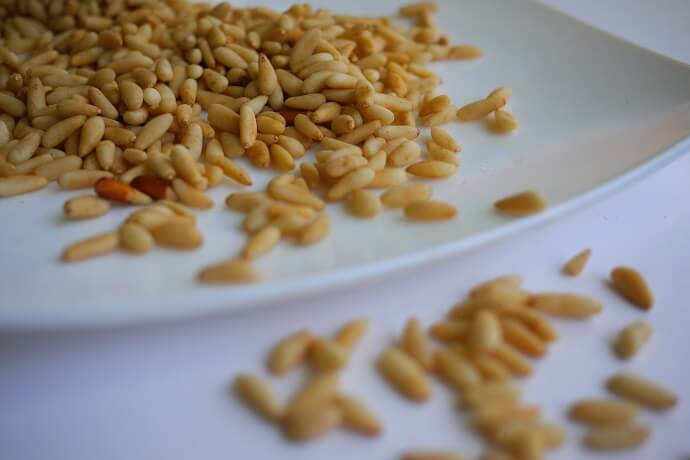
Even though pine nuts are not on any list of nuts toxic to dogs, it's still not a good idea to feed them to your pet. High in fat and phosphorus, pine nuts can irritate your dog's stomach even when eaten in small quantities. If your pups have eaten a large number of pine nuts or have been eating them regularly, they might develop pancreatitis or urinary tract complications.
Brazil Nuts
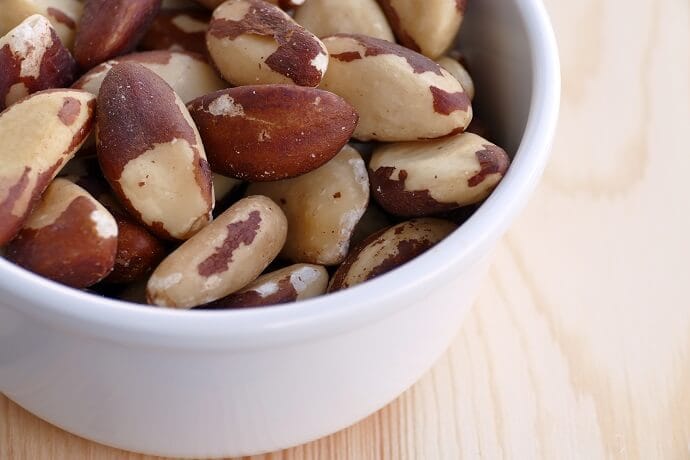
Brazil nuts are not toxic to dogs, but they are not suitable for them either. Dubbed as one of the fattiest nuts out there, brazil nuts can upset your dog's stomach and cause a myriad of digestive issues. Long-term, eating brazil nuts can cause pancreatitis in canines, so it's best to avoid giving these fatty nuts to your pooch.
So, Are Nuts Safe for Dogs?
All things considered, nuts are not the best choice for your four-legged best friend. Even though not all nuts are dangerous for dogs, prolonged consumption of nuts can lead to canine obesity and serious health issues such as pancreatitis. It's better to pamper your dog with special dog treats containing less calories and fats than nuts.
High in fat and often sodium and phosphorus as well, nuts should not be a regular part of your dog's diet. Nuts can have coatings containing pepper, onions, or garlic, as well as cocoa, sugar, chocolate or simply too much salt. In dogs who are prone to heart or kidney diseases, salt is notorious for worsening or relapsing existing health issues, as well as developing urinary stones and high blood pressure.
Also, there is always a high risk of fungal contamination, which may put your pup's health in danger. So, if your dogs happen to steal a nut or two from your stash, monitor their behavior. In case the nuts your dog ate were from the list of nuts you shouldn't give to your pooch, contact a veterinarian to avoid any potential health complications.
Read more: 25 Fruits Dogs Can and Can't Eat [+Infographic]
shelleyawneyed1946.blogspot.com
Source: https://petcube.com/blog/nuts/
0 Response to "Is It Safe to Feed Dogs Walnuts"
Postar um comentário